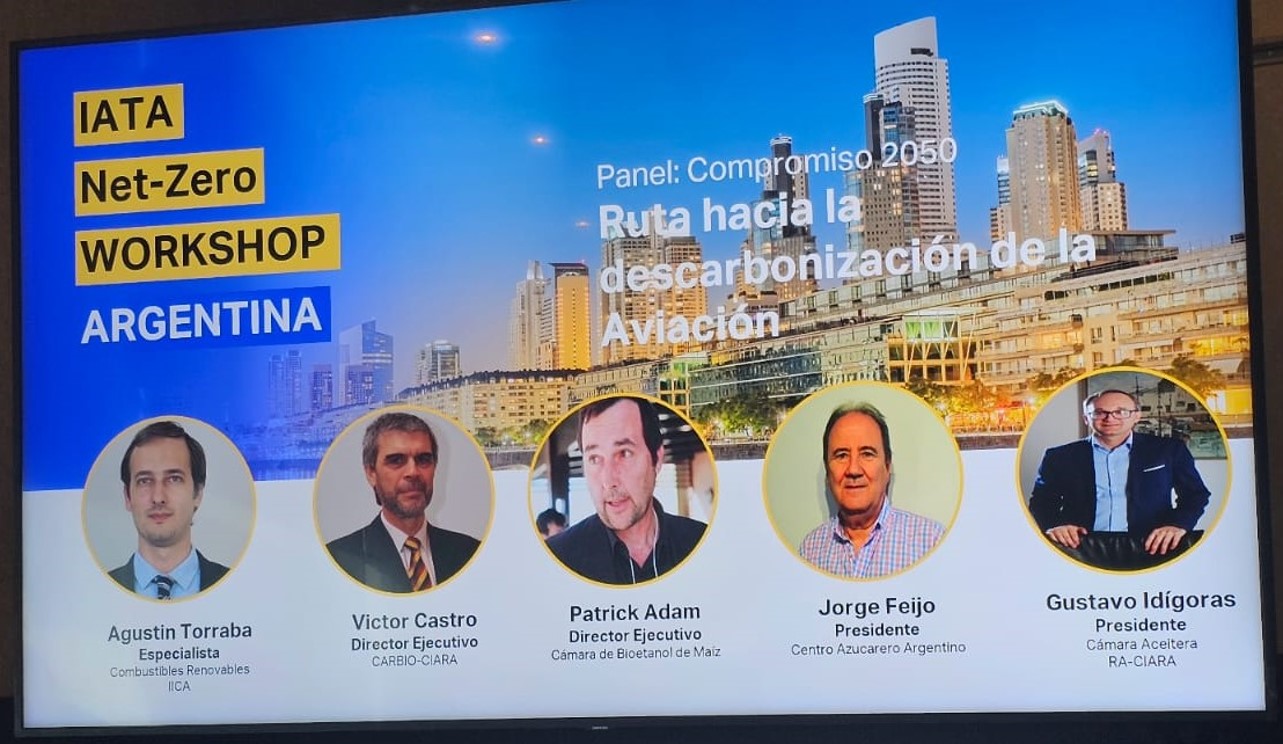During the “Aviation Day,” organized in Buenos Aires by the International Air Transport Association (IATA) and the International Airports Council for Latin America and the Caribbean (ACI-LAC), which brought together more than 450 participants.

Buenos Aires, 26 September 2024 (IICA) – Experts and representatives from the biofuels industry highlighted Argentina’s great potential to contribute to global decarbonization goals for air transport at an event attended by the Inter-American Institute for Cooperation on Agriculture (IICA) and the Pan-American Liquid Biofuels Coalition (CPBIO).
During the “Aviation Day,” organized in Buenos Aires by the International Air Transport Association (IATA) and Airports Council International for Latin America and the Caribbean (ACI-LAC), the aviation industry revealed that the goal for 2050 is to achieve an approximate 80% reduction in the carbon intensity of fuel compared to the current average of fossil fuels.
To achieve this goal, they stated that the production of sustainable aviation fuels (SAF) must increase from the current 300,000 cubic meters to at least 370 million metric tons by 2050, sourced from sustainable raw materials. Additionally, other processes and production pathways for SAF that are not yet available, especially in terms of advanced raw materials, must be developed and matured.
The event brought together more than 450 participants from across the aviation industry, the tourism sector, other stakeholders in the value chain, as well as national and provincial authorities, regulators, international organizations, suppliers, representatives of the diplomatic corps, and media outlets.
Establishing common policies
Agustín Torroba, an IICA specialist and executive secretary of the Pan American Liquid Biofuels Coalition (CPBIO), emphasized that “to develop a mass market for SAF, it is imperative to establish and harmonize sustainability standards on a global scale, as well as to develop common policies at the regional and national levels to promote production and consumption.”
“The development of coordinated national and regional regulations and public policies will be key to the emergence of the SAF industry,” Torroba added. According to experts, Argentina is one of the countries with the greatest comparative advantages for producing SAF.
“SAF is a huge opportunity: we have an abundance of biomass, we have the added value of producing ethanol from the most sustainable corn in the world (the carbon footprint, at 58%, is lower than the global average), and we have accumulated know-how in state-of-the-art plants,” stated Patrick Adam, executive director of the Corn Bioethanol Chamber (Biomaíz).
Jorge Feijóo, president of the Argentine Sugar Center, highlighted that “in the fight to reduce emissions, the sugar industry produces ethanol (50% of the blend with gasoline), and on the other hand, generates energy from biomass: all sugar mills produce the energy they consume from bagasse, and some are already selling energy to the interconnected system.”
In the same vein, Victor Castro, executive director of the Argentine Biofuels Chamber, noted that the soybean crushing industry had become accustomed to selling proteins and is now selling environmental assets. “We are producing fuels based on biogenic carbon, which are then hydrogenated and transformed into hydrocarbons sourced from agriculture, using rainwater and solar energy, instead of extracting fossils from beneath the ground,” Castro detailed.
Gustavo Idigoras, president of the Argentine Oilseed Industry Chamber and the Grains Exporting Center (CIARA-CEC), stated that they have been working with the sugar, corn, and soybean chains “with a strategic vision to be reliable suppliers in the world for this new market that can develop. In Argentina, and particularly in our industry, we have developed the capacity to survive any type of changes, both local and international.”
“It is natural to work together to learn the lessons of the last few decades, with those ultra-regulated, changing, and politically sensitive markets, but also to be economically viable and sustainably recognized and verifiable,” Idígoras explained.
“Aviation Day presented a positive outlook on the value chains of sugarcane, soybean, and corn in Argentina with a view to exploring the possibilities of developing a mass sustainable aviation fuel industry,” Torroba concluded.
The Pan-American Liquid Biofuels Coalition has developed consensus messages about the importance of SAF and how to develop it, which can be consulted here:
https://cpbiocombustibles.com/2024/08/26/2da-declaracion-de-cpbio-mensajes-sobre-la-importancia-de-los-combustibles-sostenibles-de-aviacion-csa-para-descarbonizar-el-transporte-aereo/
More information:
Institutional Communication Division.
comunicacion.institucional@iica.int











